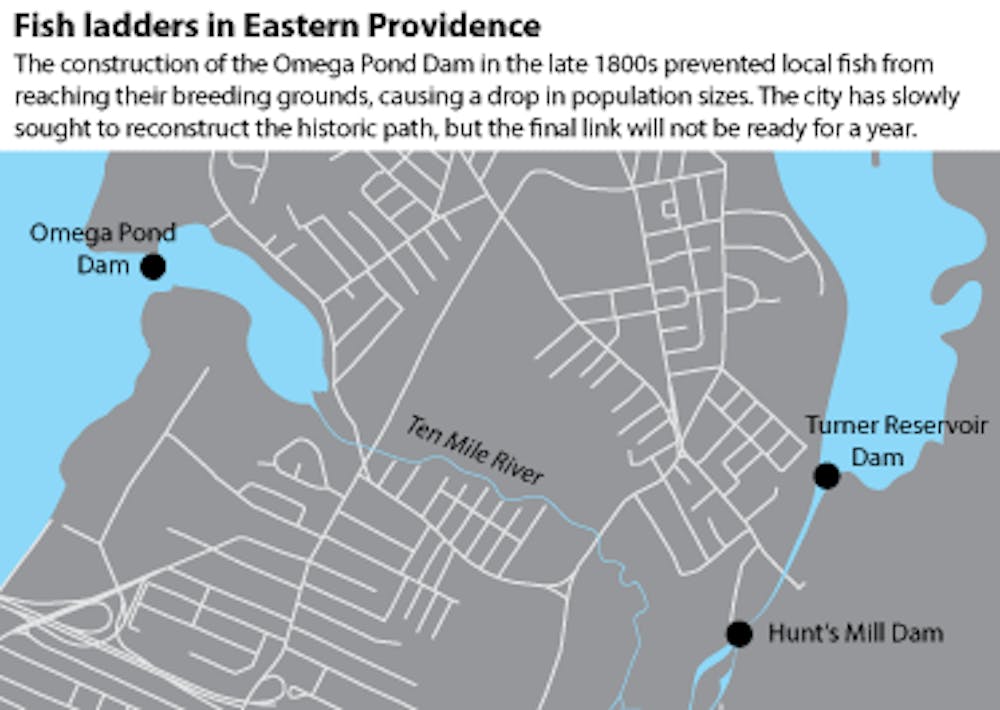A project involving the construction of three fish ladders along the Ten Mile River has met delays due to site-specific complications at the Omega Pond Dam in East Providence. The project, which is expected to add 200,000 river herring and 25,000 American shad to the existing fish population, is now scheduled for completion in summer 2015.
The fish ladder project is meant to provide anadromous fish — a species of fish that spawn in freshwater but live much of their lives in saltwater — access to an additional 340 acres of spawning habitat, said Lawrence Oliver, project manager with the U.S. Army Corps of Engineers. “The fish ladder is the way the fish make it over the dam,” he said. Two of the three fish ladders, at Hunt’s Mill Dam and Turner Reservoir Dam, are already built.
Fish have been blocked from entering the Ten Mile River since the construction of the Omega Pond dam in the 1800s, but the completion of the final fish ladder would “introduce fish into the system,” said James McGinn, supervising civil engineer for the R.I. Department of Environmental Management, which is helping sponsor the project. Under Section 206 of the Water Resources Development Act of 1996, the U.S. Army Corps of Engineers can undertake a project “to restore aquatic ecosystems for fish and wildlife” if a non-Federal sponsor requests assistance and contributes to the funding.
Omega Pond Dam is “a pretty tight spot” for a fish ladder, Oliver said. Complications include a railroad bridge running in front of the dam, a gas line through the site that must be moved and an overhead power line.
“We built a cofferdam, which is a dam that creates a dry area to do the work and we had to stop there … we were unable to work with the gas line during the winter,” Oliver said. Work on the gas line is scheduled to begin in April.
The Omega Pond fish ladder project has an estimated cost of $2.5 million, Oliver said. “As with all projects, we’ve (had) modifications, things which we didn’t realize … so there’s definitely more cost than we originally anticipated,” he added.
Funding for the three fish ladders comes from a mix of federal, state and private sources, McGinn said. In accordance with the regulations of Section 206, the R.I. Department of Environmental Management is “responsible for 35 percent of the total project costs” and will operate the fish ladders, he said. Federal sources provided 65 percent of the funding and the National Oceanic and Atmospheric Administration contributed federal stimulus dollars, according to the U.S. Army Corps of Engineers. The FishAmerica Foundation and Save the Bay are outside funding partners, that helped pay for the feasibility study conducted before the project began.
The Ten Mile River fish ladder project is “one of a number of ecosystem restoration projects we’re doing in Rhode Island and New England,” Oliver said. “The motivation is to get more fish to the ocean basically … We’re restoring their population up the Narragansett Bay and they’ll eventually go out into the ocean.”
The increased populations of herring and shad will be eaten by other species favored by fishermen, such as striped bass, allowing those populations to increase as a result, Oliver said.
“Fishermen will benefit by the fact that these fish are fed on by fish that people fish for, like striped bass,” Oliver said. “We have more prey for the predator fish to feed on.”
Until all the fish ladders are installed along the river, the only way for the fish to get over the dam is through volunteer efforts spearheaded by the Ten Mile River Watershed Council, McGinn said.
“Fish ladders will put that operation out of business, and I think the volunteers will be happy to be put out of business. The ladders will be able to pass a lot more fish than the volunteers will be able to scoop over the dam,” McGinn said.
The delays in the completion of the Omega Pond Dam fish ladder mean that the fish will not be able to independently cross the dam to spawn upstream for another season.
McGinn said that though the fish population has benefited from the volunteer effort in the past two decades, he expects the ladder to be functioning for the next fish run and to see greater numbers of fish than this year.

ADVERTISEMENT




